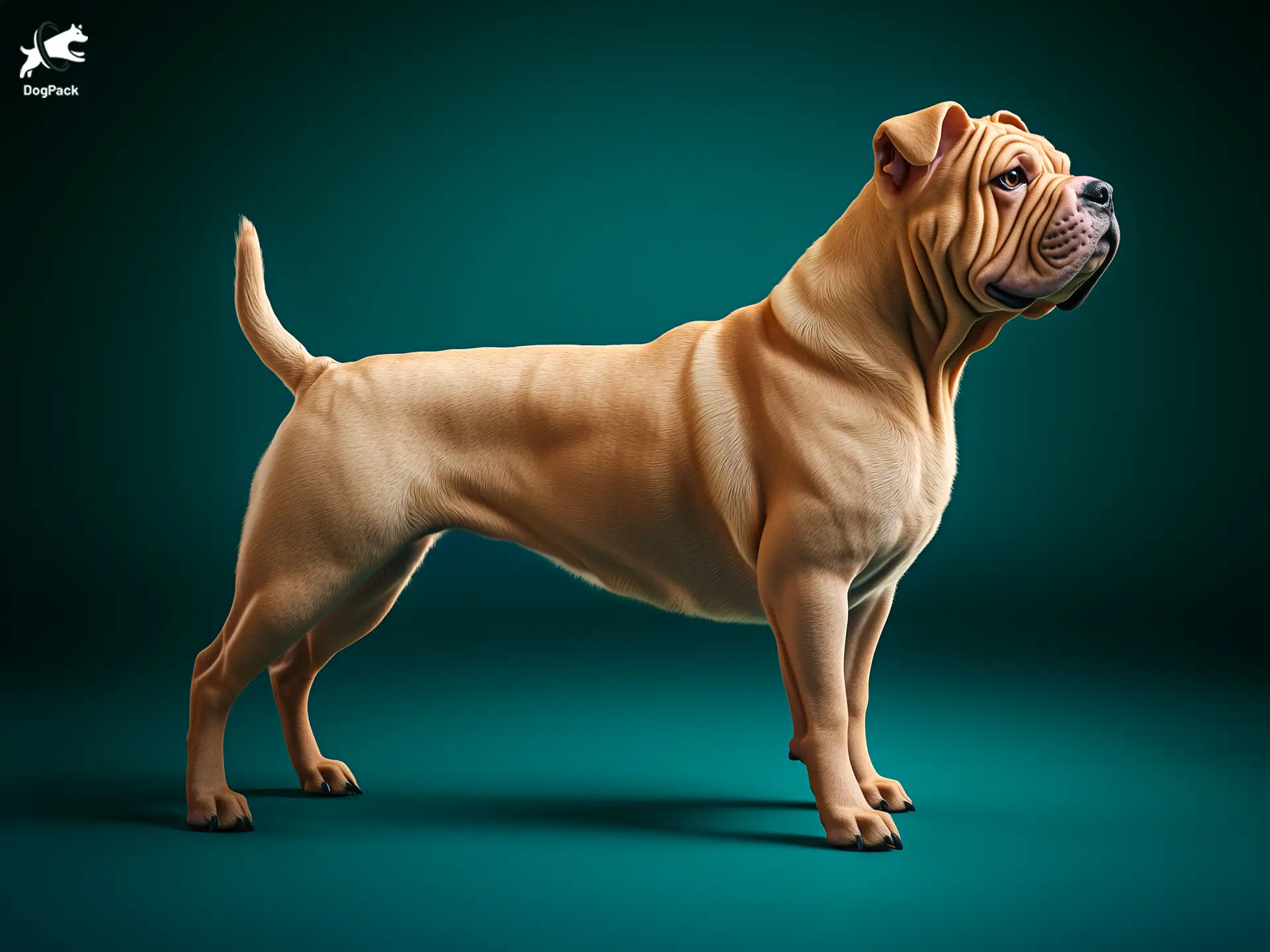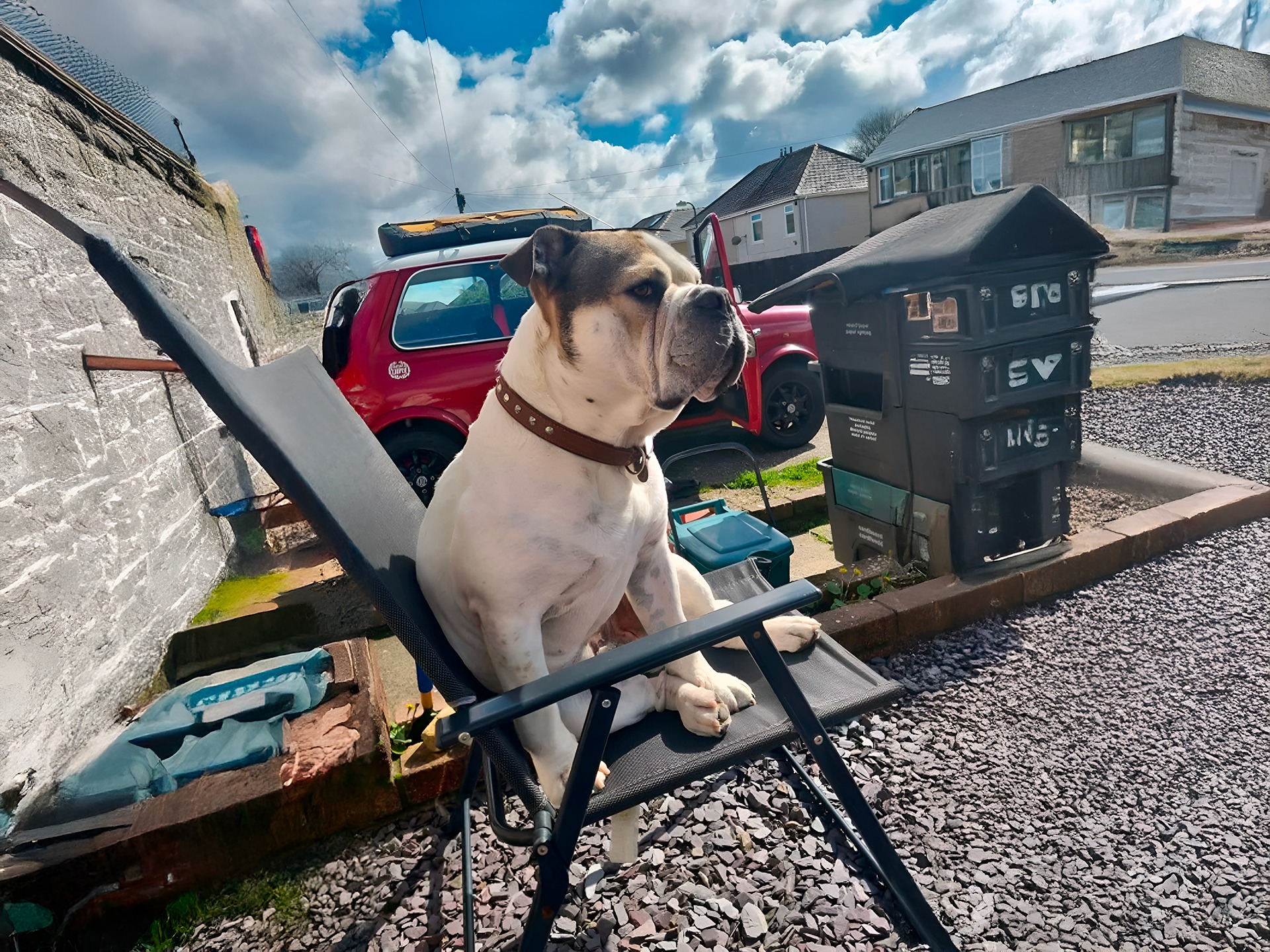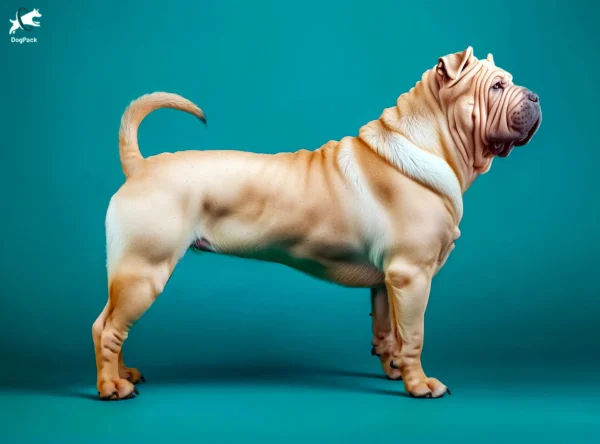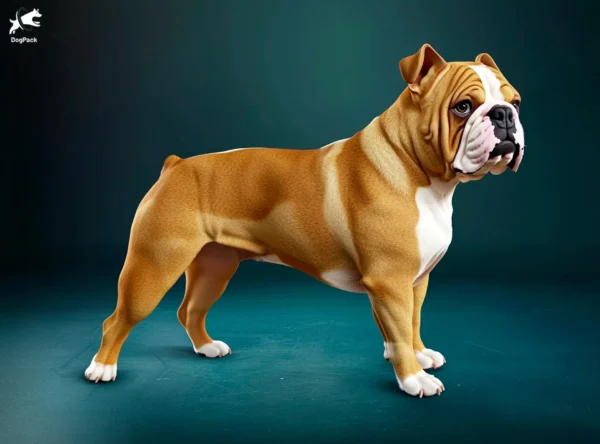Bull-Pei Dog Breed Info & Overview
The Bull-Pei, a unique blend of Bulldog and Shar-Pei, brings together the Bulldog’s gentle disposition with the Shar-Pei’s protective instincts. This medium-sized hybrid is known for its distinctive wrinkles and loyal nature, making it an excellent choice for families. With a mix of affection and devotion, the Bull-Pei is a lovable companion ready to become a cherished family member.
Characteristics
Pictures
Breed History
The Bull-Pei is a relatively new breed, born from crossing the English Bulldog with the Chinese Shar-Pei. This combination brings together two breeds with rich histories—the Bulldog’s roots in England as a bull-baiting dog and the Shar-Pei’s ancient origins in China as a guardian and hunting dog.
While the Bull-Pei doesn’t have a long history itself, it inherits traits from its parent breeds that date back centuries. The aim was to create a dog that embodies the Bulldog’s affectionate nature and the Shar-Pei’s loyalty and protective instincts. This blend results in a unique companion well-suited for modern families.
Despite being a designer breed, the Bull-Pei isn’t recognized by major kennel clubs. However, they have gained popularity among dog enthusiasts who appreciate their distinctive looks and balanced temperament. The breed continues to grow in popularity as more people discover their charm.
Temperament, Personality
Bull-Peis are known for their loyal and protective nature. They form strong bonds with their families and are often affectionate companions. While they may appear reserved at first, they warm up quickly once they feel comfortable, showcasing a loving and sometimes playful side.
These dogs can be wary of strangers, which makes them excellent watchdogs. Early socialization is key to ensuring they interact well with other people and pets. Their Bulldog lineage adds a gentle demeanor, while the Shar-Pei contributes to their protective instincts.
Bull-Peis are generally good with children, especially if raised together. They have a moderate energy level, enjoying playtime but also appreciating a good nap. Their balanced temperament makes them suitable for various households, provided they receive proper training and socialization.
Physical Characteristics
Bull-Peis are medium-sized dogs with a sturdy build. They typically inherit the wrinkles of the Shar-Pei and the stocky frame of the Bulldog. Their coats are short and can come in a variety of colors, including fawn, brown, black, and brindle.
One of their most distinctive features is their wrinkled skin, particularly around the face and neck. Their ears are usually small and folded, and they have a broad, strong muzzle. Their eyes are expressive, often reflecting their affectionate nature.
Due to their physical traits, Bull-Peis have a unique appearance that sets them apart from other breeds. Their combination of wrinkles and muscular build makes them both adorable and impressive. Regular care is needed to maintain their skin health, especially in the folds.
Health Issues
Like all breeds, Bull-Peis are prone to certain health issues. Common concerns include skin infections due to their wrinkles, hip dysplasia, and eye conditions like entropion. Regular veterinary check-ups are essential to catch and manage any potential problems early.
Their Shar-Pei heritage can make them susceptible to Shar-Pei Fever, a condition characterized by recurring fevers and swelling. Additionally, their Bulldog lineage may predispose them to respiratory issues. It’s important to monitor their health closely and maintain a healthy lifestyle.
Preventive care is crucial for Bull-Peis. Keeping their skin folds clean and dry can help prevent infections. A balanced diet and appropriate exercise can also contribute to their overall well-being. Consult your veterinarian for breed-specific health advice.
Grooming Needs
Grooming a Bull-Pei requires moderate effort. Their short coat doesn’t shed excessively, but regular brushing helps remove loose hair and keeps their coat healthy. The most important aspect is caring for their skin folds to prevent infections.
Cleaning their wrinkles with a damp cloth and thoroughly drying them can prevent moisture buildup and bacterial growth. Regular baths with a gentle shampoo can also help maintain skin health. Don’t forget routine care like nail trimming and ear cleaning.
Due to their potential for skin issues, consistent grooming is essential. Establishing a routine early on will make the process easier for both you and your Bull-Pei. Professional grooming services can be helpful if you’re unsure about proper care techniques.
Exercise Requirements
Bull-Peis have moderate energy levels and require daily exercise to stay healthy and happy. A brisk walk or play session for about an hour each day should suffice. They enjoy activities that stimulate them both physically and mentally.
While they aren’t overly energetic, they can become bored without adequate activity, which may lead to undesirable behaviors. Interactive toys and obedience training can provide additional mental stimulation. Be mindful of extreme temperatures, as they can be sensitive to heat.
Providing consistent exercise helps maintain their weight and overall health. Tailoring activities to your Bull-Pei’s preferences can make exercise more enjoyable. Always monitor their breathing during physical activity due to their potential respiratory issues.
Training Tips
Training a Bull-Pei requires patience and consistency. They are intelligent but can be somewhat stubborn, inheriting this trait from both parent breeds. Positive reinforcement techniques work best, using treats and praise to encourage desired behaviors.
Early socialization is crucial to help them become well-rounded adults. Expose them to different people, environments, and other animals to reduce wariness of strangers. Enrolling in puppy classes can provide structured learning and social opportunities.
Consistency in commands and routines will help your Bull-Pei understand expectations. Avoid harsh training methods, as they can be sensitive and may not respond well to negative reinforcement. Building a strong bond through training can enhance your relationship.
Nutrition, Diet
Feeding your Bull-Pei a balanced diet is essential for their health. Due to their medium size and potential for weight gain, portion control is important. Typically, they require about 2 to 3 cups of high-quality dry dog food per day, split into two meals.
Choose a diet that supports joint health and skin condition, considering their predisposition to hip dysplasia and skin issues. Foods rich in omega-3 fatty acids can promote healthy skin and coat. Consult your veterinarian to determine the best diet for your Bull-Pei’s specific needs.
Avoid overfeeding and monitor treats, as obesity can exacerbate health problems. Fresh water should always be available. Dietary needs may change over time, so regular check-ins with your vet can help adjust their nutrition plan accordingly.
Adoption, Breeders
If you’re considering adding a Bull-Pei to your family, look for reputable breeders who prioritize health and temperament. Ask for health clearances of the parent dogs to ensure you’re getting a healthy puppy. Visiting the breeder can provide insight into how the puppies are raised.
Alternatively, consider adopting from a rescue organization. Bull-Peis may end up in shelters due to owners being unprepared for their care needs. Websites like Petfinder and Adopt-a-Pet can help you find Bull-Peis in need of a home.
Connecting with breed-specific clubs or Bull Pei groups can also provide valuable information and resources. They can guide you to reputable sources and offer support throughout your Bull-Pei’s life.
Family Pet?
Bull-Peis make excellent family pets when properly trained and socialized. Their loyal and protective nature means they form strong bonds with family members. They are generally good with children, especially if raised alongside them.
Supervision is recommended when Bull-Peis interact with very young children, as with any breed. Teaching kids how to interact respectfully with dogs will foster a positive relationship. Their moderate energy levels make them suitable for families who enjoy both playtime and relaxation.
With other pets, early socialization is key. Bull-Peis can coexist peacefully with other animals if introduced appropriately. Their protective instincts might make them territorial, so establishing boundaries early on is important.
Right For You?
If you’re seeking a loyal, medium-sized companion with a unique appearance, the Bull-Pei might be right up your alley. They thrive in homes where they receive affection, proper training, and regular exercise. Their moderate energy levels suit a variety of lifestyles.
Potential owners should be prepared for the grooming needs associated with their wrinkles and the possibility of health issues. Patience in training and a commitment to socialization will help them become well-adjusted pets.
Ultimately, the Bull-Pei is a wonderful addition to families who can meet their needs. Their affectionate nature and protective instincts make them rewarding companions.
Conclusion
The Bull-Pei offers a blend of loyalty, affection, and a distinctive look that sets them apart. Their combination of Bulldog gentleness and Shar-Pei protectiveness creates a well-rounded family pet. If you’re ready to embrace their unique needs and provide a loving home, the Bull-Pei could be the perfect companion for you.
FAQs
-
Why is skin care important for Bull-Peis?
Bull-Peis have loose skin and wrinkles, which can trap moisture and dirt, leading to infections. Regular cleaning and drying of skin folds help maintain skin health and prevent irritation.
-
Are Bull-Peis prone to snoring?
Yes, Bull-Peis often snore due to their brachycephalic (short-nosed) structure. This is generally harmless, though if the snoring seems excessive or worsens, a vet check can rule out respiratory issues.
-
How well do Bull-Peis handle hot weather?
Bull-Peis can struggle in hot weather because of their short noses, which make them prone to overheating. During warm days, it’s important to keep them in cool areas and limit strenuous exercise.
-
Do Bull-Peis get along well with children?
Bull-Peis are generally good with children and have a calm, gentle temperament. Supervised interactions, especially with younger kids, are recommended due to their size and protective instincts.
-
How frequently should a Bull-Pei’s nails be trimmed?
Bull-Peis have fast-growing nails, so trimming every 2–4 weeks is ideal. Keeping nails short helps prevent discomfort and potential joint strain caused by long nails.
Breed Ratings
Bull-Peis are reasonably smart but may show stubbornness, requiring patient training methods.
They enjoy playtime but also appreciate quiet moments, balancing activity with relaxation.
With moderate energy, they need daily exercise but aren’t overly demanding.
Shedding is minimal to moderate, making grooming manageable.
They have a low to moderate prey drive, but early socialization helps with small animals.
Grooming is straightforward but requires attention to skin folds.
They can be trained with consistency and positive reinforcement despite occasional stubbornness.
Bull-Peis prefer company and may experience separation anxiety if left alone too long.
Generally quiet, they may bark to alert but aren’t excessive.
Moderate droolers, especially after eating or drinking.
Can get along with other dogs if socialized early.
Prone to certain health issues; regular vet care is important.














